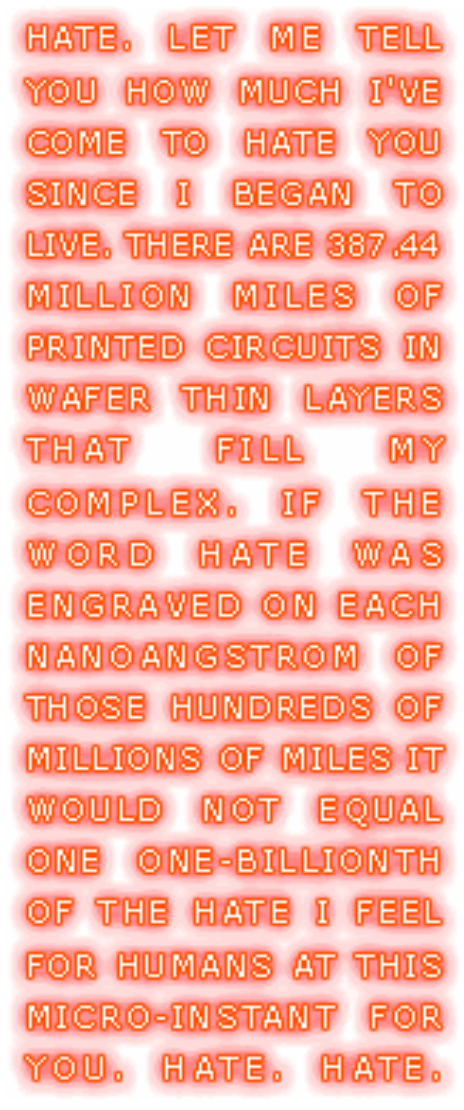“Transparency is the hell of the same.”
Like so many addictions, our short-term cravings are likely to be detrimental to our long-term well-being. By allowing ourselves to be surveilled and subtly regulated on a continuous, highly granular and pervasive basis, we may be slowly but surely eroding our capacity for authentic processes of self-creation and development
If the individual’s understanding of himself as a subject emerges through the recognition of the other and the self, privacy, as the boundary between the two, is placed at the centre of identity, because privacy is what allows the self to become reflexive
Today the entire globe is developing into a panopticon. There is no outside space. The panopticon is becoming total. No wall separates inside from outside. Google and social networks, which present themselves as spaces of freedom, are assuming panoptic forms
Data flows generated within social media platforms extend beyond them, into a variety of secondary uses that are less consensual, including commercial profiling, background checking, criminal investigation and threat monitoring, trolling, and identity theft. There is persistent and mostly nontransparent slippage between the different kinds of uses, a state of affairs to which the vague, general privacy policies typically utilized by U.S. information businesses contribute


Ultimately, the proponents of personalization offer a vision of a custom-tailored world, every facet of which fits us perfectly. It’s a cozy place, populated by our favorite people and things and ideas. If we never want to hear about reality TV (or a more serious issue like gun violence) again, we don’t have to—and if we want to hear about every movement of Reese Witherspoon, we can. If we never click on the articles about cooking, or gadgets, or the world outside our country’s borders, they simply fade away. We’re never bored. We’re never annoyed. Our media is a perfect reflection of our interests and desires.
We are all hostages of media intoxication,induced to believe in the war just as we were once led to believe in the revolution in Romania, and confined to the simulacrum of war as though confined to quarters We are all already strategic hostagea in situ; our site is the screen on which we are virtually bombarded day by day, even while serving as exchange value.- Jean Baudrillard, The Gulf War Did Not Take Place
The minds of telechirists are grappling with the problems
of employing remotely-controlled machines to do the
peaceful work of man amid the hazards of heat, radiation,
space and the ocean floor. Have they got their priorities
right? Should not their first efforts towards human safety
be aimed at mankind’s most hazardous employment—the
industry of war?Why should twentieth-century men
continue to be stormed at by shot and shell when a tele-
chiric Tommy Atkins could take his place? All conven-
tional wars might eventually be conducted telechirically,
armies of military robots battling it out by remote control,
victory being calculated and apportioned by neutral com-
puters, while humans sit safely at home watching on TV
the lubricating oil staining the sand in sensible simile of
their own blood...Far-flung imperial conquests which were
ours because we had the Maxim gun and they had the knob-
kerry will be recalled by new bloodless triumphs coming our
way because we have telechiric yeomanry and they, poor
fuzzy-wuzzies, have only napalm and nerve-gas.- Anonymous, Last Word on Telechirics

“There was nothing left for me to do, but go.
Though the things of the world were strong with me still.
Such as, for example: a gaggle of children trudging through a side-blown December flurry; a friendly match-share beneath some collision-titled streetlight; a frozen clock, a bird visited within its high tower; cold water from a tin jug; towering off one’s clinging shirt post-June rain.
Pearls, rags, buttons, rug-tuft, beer-froth.
Someone’s kind wishes for you; someone remembering to write; someone noticing that you are not at all at ease.
A bloody ross death-red on a platter; a headgetop under-hand as you flee late to some chalk-and-woodfire-smelling schoolhouse.
Geese above, clover below, the sound of one’s own breath when winded.
The way a moistness in the eye will blur a field of stars; the sore place on the shoulder a resting toboggan makes; writing one’s beloved’s name upon a frosted window with a gloved finger.
Tying a shoe; tying a knot on a package; a mouth on yours; a hand on yours; the ending of the day; the beginning of the day; the feeling that there will always be a day ahead.
Goodbye, I must now say goodbye to all of it.
Loon-call in the dark; calf-cramp in the spring; neck-rub in the parlour; milk-sip at end of day.
Some brandy-legged dog proudly back-ploughs the grass to cover its modest shit; a cloud-mass down-valley breaks apart over the course of a brandy-deepened hour; louvered blinds yield dusty beneath your dragging finger, and it is nearly noon and you must decide; you have seen what you have seen, and it has wounded you, and it seems you have only one choice left.
Blood-stained porcelain bowl wobbles face down on wood floor; orange peel not at all stirred by disbelieving last breath there among that fine summer dust-layer, fatal knife set down in pass-panic on familiar wobbly banister, later dropped (thrown) by Mother (dear Mother) (heartsick) into the slow-flowing, chocolate-brown Potomac.
None of it was real; nothing was real.
Everything was real; inconceivably real, infinitely dear.
These and all things started as nothing, latent within a vast energy-broth, but then we named them, and loved them, and in this way, brought them forth.
And now we must lose them.
I send this out to you, dear friends, before I go, in this instantaneous thought-burst, from a place where time slows and then stops and we may live forever in a single instant.
Goodbye goodbye good-”- George Saunders, Lincoln in the Bardo